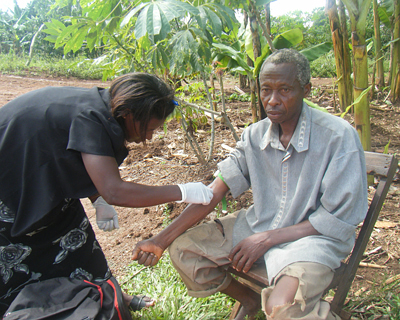Award puts Africa diabetes under the microscope

“More than 12 million people in sub-Saharan Africa are believed to have diabetes, and it is predicted that this number will double within just 20 years. It is vital that we set up a sustainable partnership of researchers across Africa with different research skills and resources to be able to tackle this growing health problem. This award will to help improve the health of Africans through the study of genomics and environmental determinants of diabetes in sub-Saharan Africa, but also train and support the next generation of research leaders in Africa.”
Professor Albert Amoah Principal investigator at the National Diabetes Management and Research Centre, University of Ghana
The funding grant for diabetes research is part of a wider initiative to develop African scientists, foster increased collaboration among African investigators and enhance the infrastructure for genomics research in Africa. It will also contribute to the training of the next generation of African researchers in the use of contemporary genomic approaches in the study of important health problems. The NIH has committed $25 million of grant support over five years, contingent on the availability of funds, and Wellcome Trust has committed $12 million over five years.
“The H3Africa initiative aims to transform the way science is conducted in Africa by creating a sustainable research infrastructure and catalyzing the use of advanced genomic technologies to improve our understanding of a variety of diseases. This is particularly relevant because, in this era of expanded global travel and communication, it is becoming increasingly clear that we must think beyond our borders when it comes to understanding human biology and improving health.”
NIH Director Francis S. Collins M.D., Ph.D.
“If we are to help tackle the growing burden of disease in Africa, it is important that we build capacity within the continent for African researchers and their institutions in order to understand the genetic and environmental causes of illness. The geographical breadth of participating institutions shows that H3Africa is about doing just this, enabling the scientists themselves to drive forward the African research agenda.”
Sir Mark Walport Director of the Wellcome Trust
The Sanger Institute will be collaborating with the network of diabetes researchers by providing DNA sequencing capacity and analysis expertise and tools to enable indepth genomic and epidemiological investigations. Dr Manj Sandhu will be coordinating the Institute’s involvement.
“I am delighted that the Wellcome Trust and NIH are funding such an ambitious and visionary project, and that we can be of help with the work. My team and I are excited that we will be able to apply our genetic and epidemiological techniques to identify the causes of diabetes in sub-Saharan Africa and, we hope, help to inform future health strategies in the region.”
Dr Manj Sandhu Wellcome Trust Sanger Institute
“H3Africa is certain to have profound and lasting effects on the landscape of genomics research in Africa. This resource will enable African researchers to study African populations, to solve African problems and to train the next generation of African scientists.”
Professor Charles Rotimi Director of the Center for Research on Genomics and Global Health, National Human Genome Research Institute
More information
Selected websites
National Human Genome Research Institute (NHGRI)
NHGRI is one of the 27 institutes and centers at NIH. The NHGRI Division of Extramural Research supports grants for research and training and career development at sites nationwide. Additional information about NHGRI can be found at http://www.genome.gov.
National Institutes of Health (NIH)
NIH, the nation’s medical research agency, includes 27 Institutes and Centers and is a component of the U.S. Department of Health and Human Services. NIH is the primary federal agency conducting and supporting basic, clinical, and translational medical research, and is investigating the causes, treatments, and cures for both common and rare diseases. For more information about NIH and its programs, visit http://www.nih.gov.
The Wellcome Trust Sanger Institute
The Wellcome Trust Sanger Institute is one of the world’s leading genome centres. Through its ability to conduct research at scale, it is able to engage in bold and long-term exploratory projects that are designed to influence and empower medical science globally. Institute research findings, generated through its own research programmes and through its leading role in international consortia, are being used to develop new diagnostics and treatments for human disease.
The Wellcome Trust
The Wellcome Trust is a global charitable foundation dedicated to achieving extraordinary improvements in human and animal health. We support the brightest minds in biomedical research and the medical humanities. Our breadth of support includes public engagement, education and the application of research to improve health. We are independent of both political and commercial interests.


